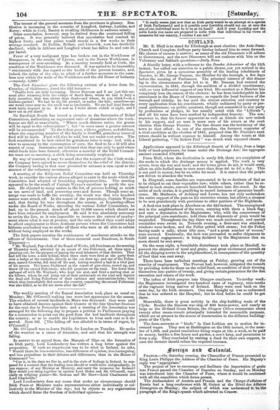SCOTLAND.
Mr. E. Miall is to stand for Edinburgh at next election; the Anti-State- Church and Complete Suffrage party having induced him to come forward. His chance of success is narrow; as many of the old Dissenters will adhere to Government, and the new Dissenters will not coalesce with him on the Voluntary and Sabbath questions.—Daily News.
A friendly letter, with a reference to the Dundee Advertiser of the 12th instant, has called our attention to a public dinner, not yet noticed in the Spectator, given by a numerous assembly of' the leading inhabitants of Dundee, to Mr. George Duncan, the Member for the borough, a few days- before the meeting of Parliament. The principal interest of this dinner- lay in the circumstances that led to it. Mr. Duncan had entered the representation, in 1841, through the accident of a divided constituency, with no very influential support of any kind. His conduct as a Member has completely won the esteem of the electors: he has been indefatigable in his attendance in the House of Commons; as regards the local business of the borough and vicinity, he has paid the utmost attention and courtesy to every application from his constituents, wholly unbiassed by party or per- sonal preferences; on public questions, though not committed to any party by professions or pledges, he has usually acted with the "Liberals "; and all his votes have been marked by independent honesty. The con- sequence is, that his former opponents as well as friends are now united in his support, and no man is more sure of his return at the next election than George Duncan. The late dinner was the testimony of the town to that effect: in one of the speeches, the foremost supporter of a rival candidate at the election of 1841, proposed that Mr. Duncan's next return should be without expense to himself. Among the toasts at this Liberal gathering, " Sir Robert Peel " was drunk with repeated cheers.
Applications appeared in the Edinburgh Gazette of Friday, from a large body of land-proprietors, for loans under the Drainage Act: the aggregate amount exceeded 170,000/.
From Mull, where the destitution is sorely felt, there are complaints of the mode in which the drainage money is applied. The work is very severe, from the wet and mud; and the terms given do not, it would seem, allow an able-bodied man to earn more than from 6d. to 8d. a day. This is not paid in money, but by an order for meal. It is stated that the people are driven to abandon the work.
In Dingwall, some families are represented to be so destitute of fuel as to be obliged to eat their vegetables raw; while others, rather than be re- duced to such straits, convert household furniture into fire-wood. In the midst of such stories, it is gratifying to record instances of generous benefi- cence. Mr. Matheson, of Acharny and Lewes, has not only undertaken the entire support of the poor on his extensive estates, but allows a steamer to be sent gratuitously with provisions to other portions of the Highlands.
A food-riot took place in Aberdeen on the 22d instant. The unemployed met in the neighbourhood of the town, carrying with them a black flag; and sent a deputation to the Magistrates; who, with the concurrence of the principal corn-merchants, told them that shipments of grain would be suspended. Throughout the day there was much excitement, and special constables were sworn in. Towards evening, a flour-cart was attacked, windows were broken, and the Police pelted with stones; but the Police having made a sally, about fifty men, and a great number of women," were secured. Eventually, the mob was persuaded to suffer shipments to fulfil actual engagements; it being declared by the Magistrates that no. more should be sent away.
On the same night, a formidable disturbance took place at Macduff, to prevent the shipment of meal and grain • and great excitement prevails at all the shipping-towns in the neighbourhood, in consequence of the quantity of food that was sent away. • There have been turbulent meetings at Paisley, growing out of the scarcity of employment. The Provost had, however, mitigated the tumult by providing webs for those on the relief-fund, on condition of their forming themselves into parties of twenty, and giving certain guarantees for the due. execution and return of the work.
- The influx of Irish paupers into Glasgow continues. Yesterday weeks the Magistrates investigated two hundred cases of vagrancy, nine-tenths of the vagrants being natives of Ireland. Many were sent back on the same day, by the Irish steamers. One man brought up was so exhausted that he was ordered to the Hospital; but he died before he could be got. there.
Meanwhile, there is great activity in the ship-building trade of the Clyde. Besides the Simoom war-ship of 800 horse-power, and nearly as large as the ill-fated Great Britain, the Glasgow Citizen enumerates about twenty other steam-vessels principally intended for mercantile purposes, which are at present in the coarse of construction in the different buildink- ports of the Clyde.
The farm-servants or " hinds " in East Lothian are in motion for in- creased wages. They met at Haddington on the 18th instant, to the num- ber of 1,500, and passed resolutions fixing wages at 12s. a week, to be paid in money, besides a free house and garden, a cow's keep, and permission to keep a pig. They concluded by starting a fund for their own support, in case the farmers should refuse the required increase.


































 Previous page
Previous page